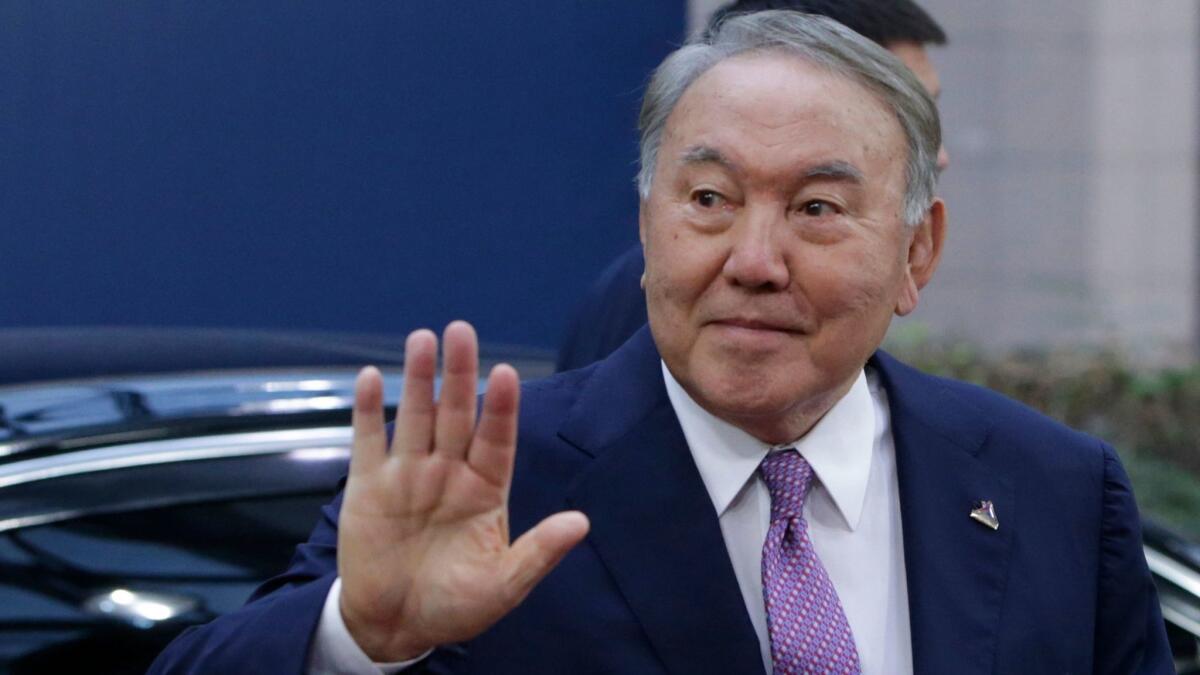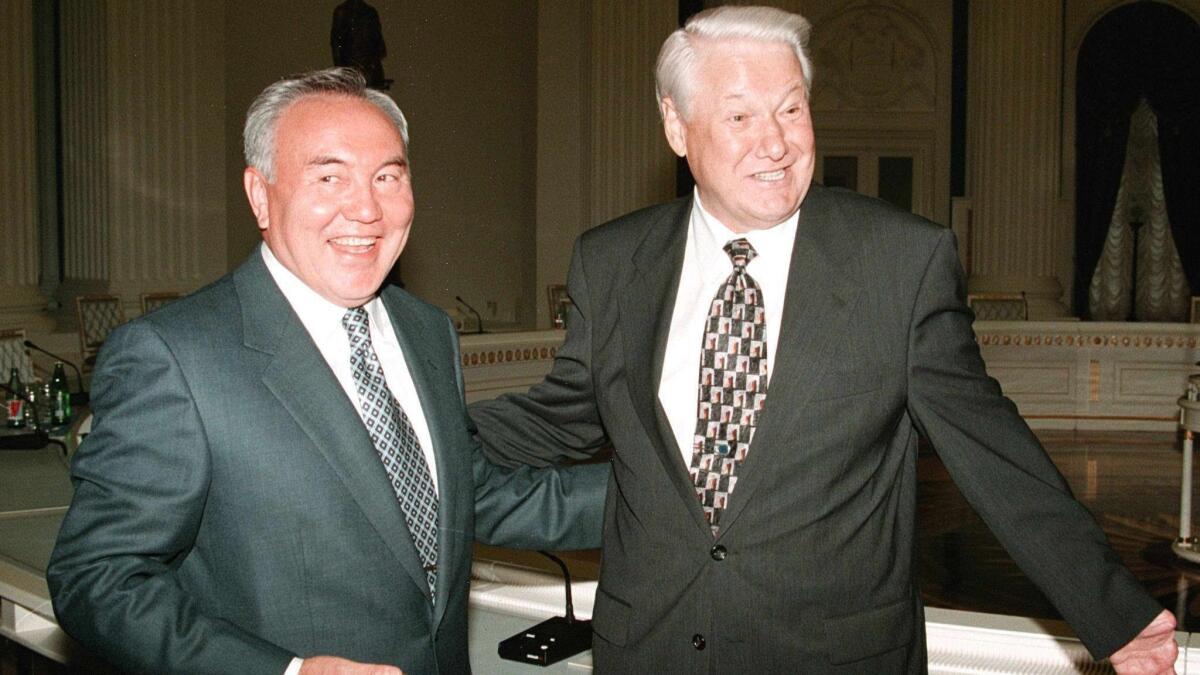He’s the only leader his country has known since independence. Now he’s stepping down ... well, sort of

Reporting from MOSCOW — Kazakh President Nursultan Nazarbayev had several parting thoughts Tuesday when he announced he was stepping down after nearly 30 years as the autocratic leader of the former Soviet republic.
One, his leadership resulted in Kazakhstan’s success after the collapse of the Soviet Union in 1991; two, he oversaw the independent nation’s strong economic growth through development of its vast oil and gas fields; oh, and three, he’s not actually going away.
Nazarbayev did not fully relinquish power, telling his Central Asian nation of 18 million people in a televised address that he would remain in some key government positions.
“I am staying with you,” said Nazarbayev, 78. “The concerns of the country and the people remain my concerns.”
Nazarbayev said Kassym-Jomart Tokayev, speaker of the upper house of Parliament, would become acting president until 2020, when the next presidential election is scheduled.
Plans call for Nazarbayev to remain leader of the Nur Otan party, which dominates Parliament, and continue as chairman of Kazakhstan’s powerful Security Council. He also retains his status as Leader of the Nation, a title with a wide-ranging definition of authority created by him and for him with a constitutional amendment nine years ago.
Some analysts described the announcement as a mix of political theater, a Nazarbayev-controlled transition of power and a lightening of the load for the only leader the large Central Asian country has known since independence.
“We see a political show that just took place; formally Nazarbayev is not president, but in reality, he is at the helm,” said Dosym Satpayev, a political analyst based in Almaty, Kazakhstan’s largest city and financial capital. Nazarbayev moved the government to the rebuilt capital, Astana, in 1997.
Under the circumstances, Nazarbayev wlll be “the hands-on manager” of the country’s transition period, said Alexander Gabuev, a senior fellow and the chair of the Russia in Asia-Pacific Program at the Carnegie Moscow Center, a think tank.
Gabuev said Nazarbayev’s handling of the upcoming changes could set a precedent for future transitions of power in the countries that had been part of the Soviet Union.
“I don’t think we have any real example of a former Soviet republic where the president holds all the power and then decided to resign,” Gabuev said in an interview. “I’m not sure Vladimir Putin will take the same way, but I think the precedent and mechanics of it will be very carefully studied.”
From the achives, 1991: Kazakhstan and its leader gain in stature »
In a Twitter post, Gabuev referred to Nazarbayev as wanting to become Kazakhstan’s version of Singapore’s Lee Kuan Yew, who was prime minister of that country from 1959 to 1990. Lee was an autocrat who is recognized for launching the industrialization of Singapore and helping it build a strong economy. He also remained politically powerful after resigning as prime minister.
“What’s important to understand about [Nazarbayev’s] resignation is that it’s part of a transition plan that has been in the making for at least 2.5 years,” Gabuev tweeted.
Kazakhstan, wedged between Russia to the north and China to the east, is rich in natural resources. But there have been signs of growing discontent in recent months. Protests in cities across the country demanded better living conditions from a government that demonstrators said had ignored the population’s needs.
The Kazakh leader’s announcement marks the second major change in recent years to the autocratic leaderships of Central Asian countries in the post-Soviet era. Neighboring Uzbekistan’s longtime president, Islam Karimov, died in 2016 after a 25-year rule that included Western criticism of human rights abuses. Uzbekistan recently has seen small signs of opening up, including the release of jailed journalists and political prisoners, under President Shavkat Mirziyoyev, who took office in late 2016.

Nazarbayev came to power as first secretary of the Communist Party of Kazakhstan in 1989, when the large Central Asian country was still a Soviet republic. When the Soviet Union broke up, Nazarbayev was elected the country’s first president and was reelected several times, most recently in 2015, sparking rumors that he intended to remain in power for life.
Nazarbayev has previously said he would like to stay in power until 2020 and once urged young Kazakh scientists to search out the secrets of immortality.
“I’m willing to go on until 2020. Just find me an elixir,” he said in 2010.
Building Kazakhstan’s bridge to the 21st century »
But rumors had been swirling for months that Nazarbayev may be getting closer to calling it quits. In February, he asked the constitutional courts to reexamine the clauses dealing with the termination of presidential duties.
In recent years, speculation has grown that Nazarbayev’s eldest daughter, Dariga, could become his successor. She has served as a deputy prime minister and chaired the powerful International Affairs, Defense and Security Committee in the upper house of Parliament.
Other possible successor candidates include Kairat Satybaldy, Nazarbayev’s nephew. Satybaldy is one of the leaders of the ruling Nur Otan party and deputy head of the Committee for National Security, Kazakhstan’s main KGB successor agency.
“He is an influential figure that resembles [Russian President Vladimir] Putin, because he comes from a security agency,” said Satpayev, the analyst. “It is hard to say whether he will become a public figure that will take part in the presidential election. But he is very likely to remain a figure who will play a key role during the transition of power.”
Nazarbayev has a close relationship with Putin and has committed Kazakhstan to the Moscow-led Eurasian Customs Union economic bloc. Putin’s own retirement has become a spectator’s game since his reelection last year and Nazarbayev’s announcement that he would step down as president yet retain a level of control in Kazakhstan could create a road map for Putin, whose fourth and last term expires in 2024.
Ayres is a special correspondent. Special correspondent Mansur Mirovalev in Kiev, Ukraine, contributed to this report.
More to Read
Sign up for Essential California
The most important California stories and recommendations in your inbox every morning.
You may occasionally receive promotional content from the Los Angeles Times.











